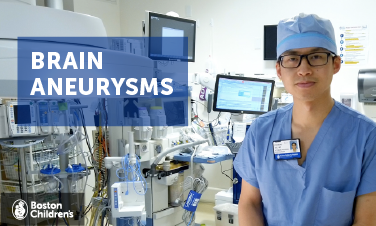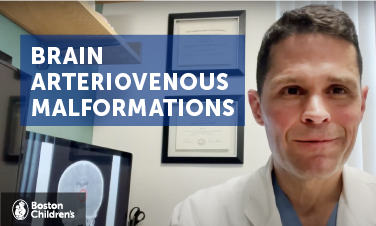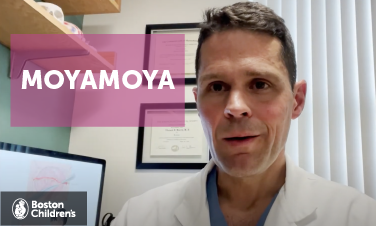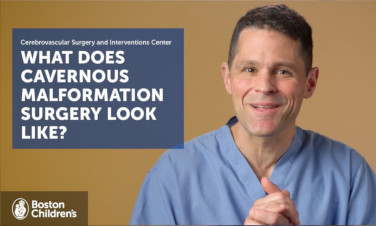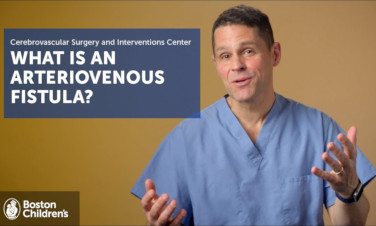At the Cerebrovascular Surgery and Interventions Center (CSIC) at Boston Children’s Hospital, we provide comprehensive care to infants, children, teenagers, and young adults with diseases and disorders affecting the blood vessels in and around the brain and spine. We’re incredibly proud of our groundbreaking work in diagnosing and treating cerebrovascular conditions such as cavernous malformations, moyamoya disease, vein of Galen malformations (VOGMs), and arteriovenous malformation (AVMs) in ways that are less invasive, safer, and faster than traditional treatments.
Our center directors, Edward Smith, MD, and Darren Orbach, MD, PhD, are renowned leaders in treating pediatric cerebrovascular disease, and our multidisciplinary team includes Alfred See, MD; Laura Lehman, MD, MPH; and other experts in areas such as neurosurgery, neurology, neurointerventional radiology, anesthesia, cardiology, neonatology, and nursing. We work together to develop the best treatment plan possible for each patient.
Why choose the Cerebrovascular Surgery and Interventions Center?
Our team provides the latest surgical and endovascular treatment for conditions such as:
- Aneurysm: A weak spot in a blood vessel in the brain, causing the vessel wall to bulge.
- Arteriovenous malformation (AVMs): A knot of abnormally joined arteries and veins. The Cerebrovascular Surgery and Interventions Center has developed innovative treatments, laboratory discoveries, and 3D technology to enhance the speed and safety of managing AVMs in children.
- Moyamoya disease: A narrowing of the brain’s internal carotid arteries that can cause stroke. The Cerebrovascular Surgery and Interventions Center is the highest-volume center for pediatric surgical revascularization of moyamoya in the U.S.
- Cavernous malformation: A cluster of abnormally dilated, thin-walled blood vessels that can resemble a small raspberry. Cavernous malformations are also called cavernomas, cavernous hemangiomas, or occult vascular malformations. We were one the first pediatric Centers of Excellence for treating cavernous malformations as designated by the Alliance to Cure Cavernous Malformation.
- Vein of Galen malformations: A rare type of arteriovenous fistula (AVF) deep in the brain that can cause heart failure soon after birth. Boston Children’s is home to groundbreaking studies in fetal interventions of vein of Galen malformations.

Baby Denver leads the way after first-of-its-kind procedure
After undergoing a fetal intervention for VOGM while she was still in her mom’s womb, Denver is thriving. Watch the video.
Children with cerebrovascular or neurovascular disease face the risk of bleeding in the brain or too little blood to the brain (ischemic stroke). To address these risks, our multidisciplinary team includes experts in areas such as:
- Blood disorders: Matthew Heeney, MD, and his colleagues in the Cancer and Blood Disorders Center at Dana-Farber/Boston Children's study the effects of bleeding and blood disorders in the cerebrovascular systems of children and young adults.
- Neurogenetics: Siddharth Srivastava, MD, helps lead a team of experts in the diagnosis and management of genetic disorders associated with brain disorders and neurodevelopmental disabilities.
- Neuroanesthesia: Craig McClain, MD, and his team are experts in the delicate art of providing anesthesia for neurosurgical procedures and interventions that involve infants, children, and young adults.
- Neurocritical care
- Neurointerventional radiology: Darren Orbach, MD PhD, and Alfred See, MD are pioneering neurointerventional care of vascular conditions affecting the brain, spine, and head and neck in infants and children. Our group’s work on minimizing x-ray exposure, procedural safety, and new catheter-based approaches optimized for small children have been adopted at many pediatric care centers across the country.
- Neurology and stroke care: Laura Lehman, MD, MPH, is the outpatient medical director of the Stroke and Cerebrovascular Center. She is a pediatric neurologist with expertise in cerebrovascular disorders and stroke in infants, children, and young adults. Her research focuses on developing imaging and cognitive biomarkers in children with moyamoya to assist with surgical decision-making and long-term outcomes.
- Neuroradiology: Darren Orbach, MD, PhD; Ed Yang, MD, PhD; Joanne Rispoli, MD; and Caroline Robson, MD, are leading efforts to innovate how we optimize clinical imaging of the brain, spine, and head and neck.
- Neurosurgery: Edward Smith, MD, and Alfred See, MD, are pioneering surgical care of diseases and disorders of the brain, spine, and nervous system that focus on using minimally invasive techniques whenever possible.
- Vascular anomalies: Ahmad Alomari, MD, and Steven J. Fishman, MD, lead a group of dedicated experts focused on caring for children and adults with vascular anomalies, including vascular tumors and malformations.
We use a range of surgical and endovascular techniques to treat cerebrovascular and neurovascular conditions, ideally before they cause serious brain injury.
Also instrumental to our team are our dedicated nurse practitioners, including Christopher Isibor and Jennifer Judge, who have specialized training and expertise in the field of cerebrovascular conditions and neurosurgery. Our nurse practitioners help lead our efforts in patient assessment and evaluation, diagnosis and treatment planning, postoperative care, medication management, and patient and family education and advocacy. Working with our program coordinator, our nurse practitioners help before, during, and after treatment.
Our goal is to provide a seamless, team-based, and personalized approach to care.
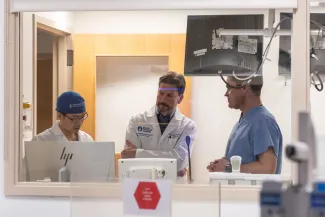
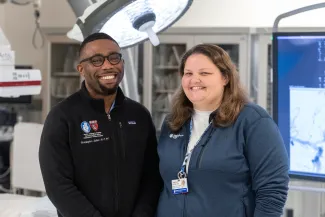
Science-driven care
Our team is an international leader in publishing innovative methods for evaluating and treating cerebrovascular and neurovascular conditions in children, teens, and young adults (see our selected publications). Many interventions, such as pial synangiosis for moyamoya and fetal intervention of vein of Galen malformations, were developed at Boston Children’s.
We’ve established one of the world's largest global studies of pediatric cerebrovascular disease, which informs our approach to care and provides new hope to children with complicated cerebrovascular and neurovascular conditions. Our commitment to research has led to innovations that have impacted national guidelines and influenced care approaches to cerebrovascular disease worldwide.
National statistics show that Boston Children’s has the highest volume of several complex pediatric cerebrovascular disorders in the U.S.

